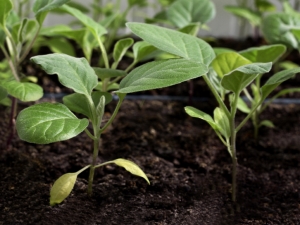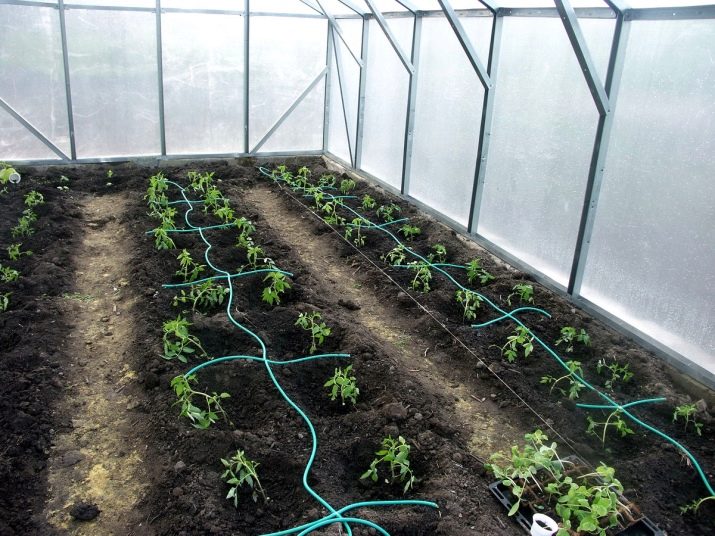Why not tied eggplant?

In gardening it often happens that when flowering such a culture as eggplant is simply not tied.In the meantime, plants could have developed and grown beautifully before. But the factors that could lead to the emergence of this problem can be attributed to many different reasons. And they are concluded mainly in the illiterate care of vegetables. This often happens when growing plants in greenhouse conditions.
The reasons for the absence of ovaries
Eggplant is considered to be quite a whimsical crop, which is why the plant should be provided with all the necessary conditions for growth and development, and unfavorable conditions should also be excluded.
The reasons why there are no eggplant ovaries can be many.
- Landing point selected incorrectly. When plants are planted close to each other, a shadow is created, and this is considered to be a direct threat, since the shadow may have a bad effect on the formation of ovaries. Therefore, planting should not be carried out near trees or tall crops.
- Temperature is not suitable. For excellent growth, the optimum temperature is considered to be 25 ° -27 ° C. Temperature drop will also adversely affect the formation of ovaries.
- The soil is not suitable for culture. To obtain a rich harvest, it is necessary to plant fertile and drained soil, the pH level of the soil should be neutral. Considered unacceptable podzolic soil and clay with a high level of acidity and high density - all this simply does not allow the earth to warm. It is in such conditions that the fruits of eggplant will be tied badly.
- Watering is done incorrectly. Moist soil contributes to the formation and further formation of flowers, and this will correspondingly affect fruiting. Watering should be done infrequently, but the culture should be watered abundantly. It is necessary to moisturize the soil to a depth of 50 cm. Frequent watering can lead to a decline in the formation of ovaries, as well as to their further fall.
- Excessive effect of fertilizers. When feeding for eggplant, you need to carefully monitor the amount of added nutrients. Since a glut of nitrogen will lead to a strong increase in green mass in plants, this will only adversely affect the formation and further formation of ovaries. Flowers in this case will be very small. And those that have already appeared will eventually dry out and then disappear altogether. For this reason, the beneficial substances that contain nitrogen, it is recommended to make only the necessary dosages.
- Excess pollen. Eggplant bushes are mostly self-pollinated. And for growing vegetables in the greenhouse it is considered quite convenient. And yet it happens when the pollen simply cannot be transferred to the inflorescences of bushes growing nearby. Too much pollen or too much moisture can be the cause. When accumulated over time, the pollen becomes heavier, begins to stick together. Thus, the pollination procedure is broken, then the ovaries are not formed.
Too dark area. Sometimes eggplants can not form the ovary for a fairly simple reason - the beds are located on a dark area. Therefore, if trees grow near the planted crop, they will have to prune their crown so that sunlight can see through it. And yet it is better to immediately select the site for planting.
It is always possible to prevent improper or poor education and the formation of fruits, the main thing is to adhere to the existing rules.
- Planting seedlings need in the illuminated area.
- Perform soil analysis. In the greenhouse, the land is specially prepared before planting the crop, that is, adding turf land with humus.
- It is necessary to properly form the bushes, that is, to completely remove the incorrectly formed ovaries with leaflets that prevent flowers from receiving sunlight. Here the main thing - do not overdo it. Many leaves can not be removed.Since this can disrupt the entire development process in a plant. In time should be removed sick yellow leaves. During the formation of the fruit you need to remove the remaining flower rims, because if this is not done, it will begin to rot. And this can lead to damage and subsequent rotting of the fetus itself.
- It should be more often to air the greenhouse. You should always monitor the temperature inside. To lower the temperature, you can raise several frames. If the temperature is too low at night, the seedlings need to be covered with protective material. In addition, you can use ordinary hay. In order for the soil to warm up before planting, for example, in the autumn, trenches that have been dug in advance are filled with slightly rotted manure, sometimes compost is used instead of manure.
- The soil needs to be moistened properly. Watering should be done once in 7-10 days, with about 40 liters of water being spent per square meter of land. In addition, the earth must be saturated with oxygen, for this it is necessary to regularly loosen it.
- To prevent the drying of pollen, it is necessary from time to time to shake it from the flowers. Similarly, one can even increase pollination. With varieties that require pollinators, the procedure is carried out artificially. Here you can use a brush to take pollen from a yellow ripened anther, and then transfer it to the stigmas of the pestles of flowers.
Fertilize the culture need for a special scheme. The first dressing needs to be done several weeks immediately after the seedlings are planted. The next feeding should be done before the formation of eggplant fruit, it is better to use a complex of drugs. Final fertilizing should be done during fruiting, it is better to use potash type of fertilizer with phosphate.
Causes of bud fall
The most common unpleasant problem is the fall of the buds on the eggplant bushes before they bloom.
The reasons for this, by the way, are the most common:
- sharp temperature drop;
- drying of the soil;
- insufficient number of trace elements.
Recommendations and Tips
To begin with, the agrotechnology of the crop itself should be observed, the soil should be appropriate, as should the fertilizer. Planting should be carried out in a rassadny way, monitor the temperature, properly watering, care for the plants.
If the climatic conditions for the cultivation of eggplant culture are too cold, and the summer season is short and short, then it is better to choose a precocious variety and plant it in the greenhouse.
In addition to good lighting and regular watering, you should monitor the weeds on the beds, they should not be, and if they appear, you need to immediately eliminate them. If you follow all the recommendations, the ovaries, buds and leaves do not fall off and remain in place, and the eggplant will bring a great harvest. One should not forget about fertilizers, since not a single cultivated plant is able to independently produce mineral compounds in sufficient quantity to ensure full fruiting, flowering or growth.
The secrets of a good harvest of eggplants can be found in the video below.



























